
"Ali Baba and the Forty Thieves" is a folk tale in Arabic added to the One Thousand and One Nights in the 18th century by its French translator Antoine Galland, who heard it from Syrian storyteller Hanna Diyab. As one of the most popular Arabian Nights tales, it has been widely retold and performed in many media across the world, especially for children.
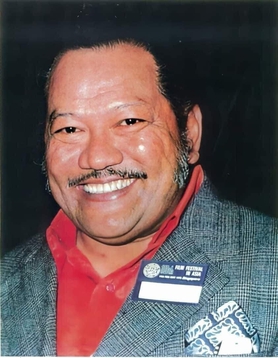
Tan Sri Datuk Amar Teuku Zakaria bin Teuku Nyak Puteh, better known by his stage name P. Ramlee, was a Malaysian actor, filmmaker, musician, and composer famous in modern-day Singapore, Malaysia, Indonesia and Southern Thailand. Born in Penang, Malaya, he is regarded as a prominent icon of Malay language entertainment.
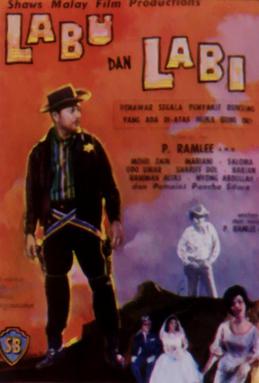
Labu dan Labi is a 1962 Singaporean Malay-language black-and-white buddy comedy film directed by and starring P. Ramlee. The movie was filmed in Singapore and it revolves around the antics of Labu and Labi, two servants with wild imaginations who work in the house of a wealthy but miserly man, Haji Bakhil bin Haji Kedekut. The movie is filmed in the style of a stage pantomime, with over-the-top comedy and featuring the characters occasionally talking directly to the audience. The film's sequel is Nasib Si Labu Labi.

Madu Tiga is a 1964 Singaporean black-and-white Malay-language romantic comedy film directed by and starring P. Ramlee, Sarimah, Ahmad Nisfu and M. Rafiee.

Muhammad Saiful Azam bin Mohamed Yusoff or better known as Saiful Apek is a comedian of Malaysia. He was once called "Malaysia's No.1 Comedian" during his heyday and also the title of "Sifu" by comedians today. Until today, his aura and credibility as a comedian are unparalleled and unmatched. He is known as an intellectual comedian who is knowledgeable in every word and manners while entertaining.
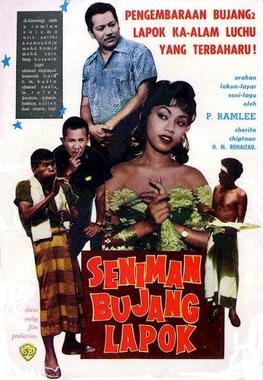
Seniman Bujang Lapok is a 1961 Singaporean Malay-language black-and-white comedy film directed by P. Ramlee. It is the fourth instalment in the Bujang Lapok series of films, but the last to feature P. Ramlee, S. Shamsuddin and Aziz Sattar as the main trio of actors. However, it is not a direct sequel to the previous "Bujang Lapok" films, as there are no references to the events of the previous films.
Pendekar Bujang Lapok is a 1959 Singaporean Malay-language black-and-white comedy film directed by P. Ramlee. It is the second in the Bujang Lapok series of films, and stars the trio of P. Ramlee, S. Shamsuddin and Aziz Sattar, all of which was filmed on site at Jalan Ampas, Singapore.

Nujum Pak Belalang is a 1959 Singaporean Malay-language black-and-white comedy film directed by and starring P. Ramlee. The film is styled as a fairytale and is loosely based on a Malay folk tale.

Datuk Abdul Aziz bin Sattar was a Malaysian actor, singer, comedian, and director who is mostly known for his roles in the black and white Malay films of the 1950s and 1960s.
Budak Lapok is a 2007 Malaysian animated film. Based on the P. Ramlee film Bujang Lapok, the film premiered on 13 October 2007 and was directed by Anwardi Jamil. It became the first Malaysian animated movie released in six years since Putih in 2001.

Ali Baba and the Forty Thieves is a 1944 adventure film from Universal Pictures, directed by Arthur Lubin, and starring Maria Montez, Jon Hall, and Turhan Bey. The film is derived from The Book of One Thousand and One Nights, but its storyline departs greatly from the folk tale of the same name, wedding that story to an actual historic event. The film is one of series of "exotic" tales released by Universal during the Second World War; others include Cobra Woman, Arabian Nights, and White Savage.
Bujang Lapok is a 1957 Singaporean Malay-language black-and-white comedy film directed and performed by P. Ramlee. This is the first installment of the Bujang Lapok series of films.
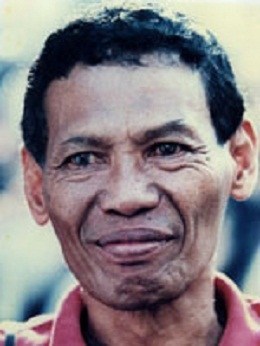
Shamsuddin bin Dali, better known as S. Shamsuddin, was a Singaporean actor and comedian who appeared in Malayan films during the 1950s and 1960s.
Bujang Lapok Kembali Daa, or The Return of the Three Bachelors is a 1985 Malaysia Malay-language comedy film directed, written and acted in by Aziz Sattar. In this film, P. Ramlee's son, Nasir (1953-2008) took over his late father's place in the trio. This would be the fifth and last installment of Bujang Lapok film series.

Sarjan Hassan is 1958 Singaporean Malay-language black-and-white war drama film starring P. Ramlee. The film is set during the Japanese invasion of Malaya during the Second World War. Initially, the film was supposed to be directed by Lamberto Avellana; however, he was unable to fully complete the film. The directing task was later taken over by P. Ramlee.
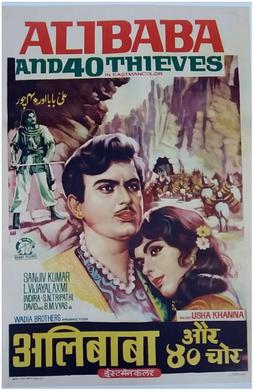
Alibaba Aur 40 Chor is 1966 Hindi adventure fantasy film produced and directed by Homi Wadia and starring Sanjeev Kumar in the lead role. The film is based on Ali Baba's story from One Thousand and One Nights.

Ali Baba is a 1973 Bengali short animated film directed by Rohit Mohra. It is a musical drama about the character Ali Baba from the folk tale Ali Baba and the Forty Thieves who discovers the secret of a thieves' den, to the ire of the thieves. Ali Baba is a poor woodcutter who discovers the secret of a thieves' den, entered with the phrase "Open Sesame". The thieves learn of Ali Baba's discovery and try to kill Ali Baba, but Ali Baba's faithful slave-girl foils their plots. Ali Baba gives his son to her in marriage and keeps the secret of the treasure.
The Bujang Lapok film series consists of five comedy films:
- Bujang Lapok (1957)
- Pendekar Bujang Lapok (1959)
- Ali Baba Bujang Lapok (1960)
- Seniman Bujang Lapok (1961)
- Bujang Lapok Kembali Daa (1986)
Marfuah Makarim, better known by the stage name Momo Latiff, was an Indonesian-born Singaporean singer and actress who was active in the 1950s and 1960s. Her successful songs included "Pantai Chinta Berahi" to the music of pianist Dodo Mallinger. Originally a dancer, she was contracted as singer by Shaw Brothers for films such as Putus Harapan (1955) and Pendekar Bujang Lapok (1959).

Ali Baba is an Indian fantasy television series based on the Arabian Nights character Ali Baba. Produced by Alind Srivastava and Nissar Parvez under Peninsula Pictures. The series follows the life of an orphan Alibaba, from the Mamuli Gali of Kabul, and the challenges he faces while he tries to protect and take care of five other orphan children.














